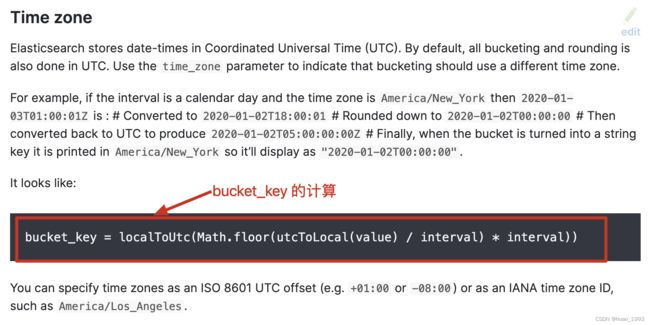Es直方图聚合--date_histogram
文章目录
- 1、背景
- 2、bucket_key如何计算
- 3、前置知识
- 4、日历和固定时间间隔
-
- 4.1 Calendar intervals 日历间隔
- 4.2 Fixed intervals 固定间隔
- 5、数据准备
-
- 5.1 准备mapping
- 5.2 准备数据
- 6、聚合案例
-
- 6.1 dsl
- 6.2 java代码
- 6.3 聚合结果
- 7、完整代码
- 8、参考文档
1、背景
此处来简单学习一下 elasticsearch 的 date_histogram直方图聚合。它和普通的直方图histogram聚合差不多,但是date_histogram只可于 日期或日期范围 类型的值一起使用。
2、bucket_key如何计算
- 假设我们存在如下时间
2022-11-29 23:59:59。 - 在
es中时间为2022-11-29 23:59:59 +0000,因为上方的时间没有时区,所以会自动加上0时区,对应的时间戳为1669766399000 - 此处假设以
1d为单位来聚合 - 聚合统计中
time_zone的值为+0800 - bucket_key计算公式为
bucket_key = localToUtc(Math.floor(utcToLocal(value) / interval) * interval))
计算步骤如下:(此处是我自己的理解,如果不对欢迎指出)
utcToLocal(value)= 1669766399000(utc的值)+8*60*60*1000(time_zone +8的值) = 1669795199000Math.floor(utcToLocal(value) / interval) * interval)= Math.floor(1669795199000 / (24*60*60*1000)) * (24*60*60*1000) = 1669766400000localToUtc(...)=1669766400000-86060*1000=1669737600000key_as_string=utc时间1669737600000转换成东八区时间展示为=2022/11/30 00:00:00
3、前置知识
- 日期(
date)类型的字段在es中是以long类型的值保存的。 es中默认 默认的时区是0时区。- 如果我们有一个东八区的时间,那么在es中是如何存储的呢?
- 假设存在如下mapping
"invoked_time": {
"type": "date",
"format": ["yyyy-MM-dd HH:mm:ss"]
}
- 1
- 2
- 3
- 4
- 如果我们此时存在 如下
东八区时间2022-11-29 12:12:12,那么在 es 会存储为2022-11-29 12:12:12 +0000对应的时间戳,为什么会加上+0000,因为我们自己的时间字符串中没有时区,就会加上默认的0时区。
4、日历和固定时间间隔
既然我们是根据时间来进行聚合,那么必然就会涉及到这么一个问题。假设以天为单位来聚合,那么1天到底是固定的24小时呢,还是可变的呢? 因为存在时区的关系,在有的国家,在某些时区下,一天就不一定是24个小时。因此在es中提供了calendar-aware time intervals, 和 fixed time intervals. 两种类型。
4.1 Calendar intervals 日历间隔
日历感知间隔使用calendar_interval参数配置。 它可以自动感应到日历中的时区变化。它的单位只能是单数,不可是复数,比如2d就是错误的。
日历间隔 可用的单位为:分钟 (1m)、小时 (1h)、天 (1d)、星期 (1w)、月 (1M)、季度 (1q)、年 (1y)
举个例子:1m 是从何时开始的,何时结束的?.
所有的分钟都从00秒开始。一分钟是指定时区中第一分钟的00秒和下一分钟的00秒之间的时间间隔,用于补偿任何介于其间的闰秒,因此整点后的分钟数和秒数在开始和结束时是相同的。
4.2 Fixed intervals 固定间隔
固定间隔使用fixed_interval参数进行配置。
与日历感知间隔相比,固定间隔是固定数量的SI单位,无论它们落在日历的哪个位置,都不会偏离。一秒总是由1000ms组成。这允许以支持的单位的任意倍数指定固定间隔。但是,这意味着固定间隔不能表示其他单位,例如月,因为一个月的持续时间不是固定的数量。尝试指定月或季度等日历间隔将引发异常。
固定间隔 可用的单位为:
毫秒 (ms)
秒 (s)
定义为每个1000毫秒
分钟 (m)
所有分钟都从00秒开始。 定义为每个60秒(60,000毫秒)
小时 (h)
所有小时都从00分00秒开始。 定义为每60分钟(3,600,000毫秒)
天 (d)
所有天都在尽可能早的时间开始,通常是00:00:00(午夜)。 定义为24小时(86,400,000毫秒)
5、数据准备
5.1 准备mapping
PUT /index_api_invoked_time
{
"settings": {
"number_of_shards": 1
},
"mappings": {
"properties": {
"id": {
"type": "long"
},
"api": {
"type": "keyword"
},
"invoked_time": {
"type": "date",
"format": ["yyyy-MM-dd HH:mm:ss"]
}
}
}
}
- 1
- 2
- 3
- 4
- 5
- 6
- 7
- 8
- 9
- 10
- 11
- 12
- 13
- 14
- 15
- 16
- 17
- 18
- 19
- 20
5.2 准备数据
PUT /index_api_invoked_time/_bulk
{"index":{"_id":1}}
{"api":"/user/infos","invoked_time": "2022-11-26 00:00:00"}
{"index":{"_id":2}}
{"api":"/user/add"}
{"index":{"_id":3}}
{"api":"/user/update","invoked_time": "2022-11-26 23:59:59"}
{"index":{"_id":4}}
{"api":"/user/list","invoked_time": "2022-11-27 00:00:00"}
{"index":{"_id":5}}
{"api":"/user/export","invoked_time": "2022-11-29 23:59:59"}
{"index":{"_id":6}}
{"api":"/user/detail","invoked_time": "2022-12-01 01:00:00"}
- 1
- 2
- 3
- 4
- 5
- 6
- 7
- 8
- 9
- 10
- 11
- 12
- 13
6、聚合案例
6.1 dsl
POST /index_api_invoked_time/_search
{
"size": 0,
"aggregations": {
"agg_01": {
"date_histogram": {
"field": "invoked_time",
"calendar_interval": "1d",
"min_doc_count": 0,
"missing": "2022-11-27 23:59:59",
"time_zone": "+08:00",
"offset":"+10h",
"extended_bounds": {
"min": "2022-11-26 10:00:00",
"max": "2022-12-03 10:00:00"
}
}
}
}
}
- 1
- 2
- 3
- 4
- 5
- 6
- 7
- 8
- 9
- 10
- 11
- 12
- 13
- 14
- 15
- 16
- 17
- 18
- 19
- 20
6.2 java代码
@Test
@DisplayName("日期直方图聚合")
public void test01() throws IOException {
SearchRequest request = SearchRequest.of(searchRequest ->
searchRequest.index("index_api_invoked_time")
.size(0)
.aggregations("agg_01", agg ->
agg.dateHistogram(dateAgg ->
// 聚合的字段
dateAgg.field("invoked_time")
// 聚合的单位,日历感知 单位为天,此时的一天不一定为24小时,因为夏令时时,有些国家一天可能只有23个小时
.calendarInterval(CalendarInterval.Day)
// 固定间隔, 此处可以指定 1天就是24小时
// .fixedInterval()
// 如果聚合的桶中,没有文档也返回
.minDocCount(0)
// 对于文档中,聚合字段缺失,此处给一个默认值,默认情况是此文档不参与聚合
.missing(DateTime.of("2022-11-27 23:59:59", DateTimeFormatter.ofPattern("yyyy-MM-dd HH:mm:ss")))
// 时区
.timeZone("+08:00")
// 偏移,偏移是在时间在对应的时区调整之后,再去偏移
.offset(time -> time.time("+10h"))
// 如果返回的桶数据不在这个边界中,则给默认值,不会对数据进行过滤。
.extendedBounds(bounds ->
bounds.min(FieldDateMath.of(f -> f.expr("2022-11-26 10:00:00")))
.max(FieldDateMath.of(f -> f.expr("2022-12-03 10:00:00")))
)
)
)
);
System.out.println("request: " + request);
SearchResponse<String> response = client.search(request, String.class);
System.out.println("response: " + response);
}
- 1
- 2
- 3
- 4
- 5
- 6
- 7
- 8
- 9
- 10
- 11
- 12
- 13
- 14
- 15
- 16
- 17
- 18
- 19
- 20
- 21
- 22
- 23
- 24
- 25
- 26
- 27
- 28
- 29
- 30
- 31
- 32
- 33
- 34
6.3 聚合结果
7、完整代码
https://gitee.com/huan1993/spring-cloud-parent/blob/master/es/es8-api/src/main/java/com/huan/es8/aggregations/bucket/DateHistogramAggs.java
8、参考文档
- https://www.elastic.co/guide/en/elasticsearch/reference/current/search-aggregations-bucket-datehistogram-aggregation.html#date-histogram-missing-value
- https://www.pipiho.com/es/7.7/cn/search-aggregations-bucket-datehistogram-aggregation.html
